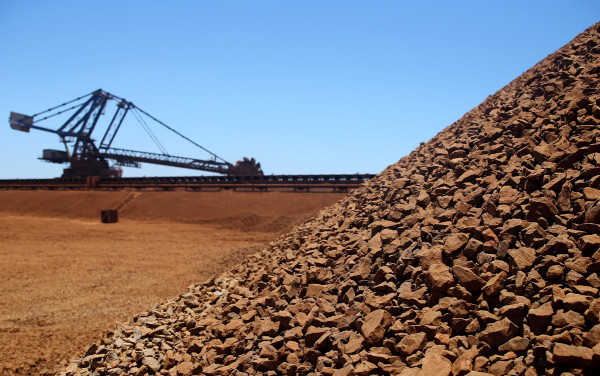
Iron ore exports from Australia’s Port Hedland expanded to an all-time high in May on increased low-cost supply from the world’s largest shipper.
Cargoes from the biggest bulk-export terminal climbed 7.4 percent to 38 million metric tons last month from April, according to data from the Pilbara Ports Authority. That compares with 36.05 million tons the same month a year earlier, the figures showed. Exports to China rose to 31.7 million tons from 30.1 million tons in April and 29.9 million in May 2014.
Iron ore prices rose to a three-month high on Thursday as port holdings in China fell after lower-than-expected shipments from Australia and Brazil in April. The latest data from Port Hedland, which handles cargoes from BHP Billiton Ltd. and Fortescue Metals Group Ltd., signaled the pace of shipments picked back up. Goldman Sachs Group Inc. is among banks saying the rally in prices won’t last as supplies expand further.
“More and more iron ore will be sourced from Australia in particular, and less from minor exporters and from domestic Chinese producers,” Ralph Leszczynski, Singapore-based head of research at Banchero Costa & Co., a Genoa-based shipbroker, said by phone on Thursday. The major producers “are the only ones who are able to survive the current low prices,” he said.
In the first five months of 2015, exports through Port Hedland totaled 182.4 million tons, 13 percent more than a year ago, as cargoes to China rose 18 percent to 153.5 million tons, the data showed. This month’s record topped the previous high, set in October. Exports to China were the highest this year.
Three-Month High
Ore with 62 percent content delivered to Qingdao jumped 2.3 percent to $64.77 a dry ton on Thursday, the highest price since Feb. 16, according to Metal Bulletin Ltd. Prices jumped 38 percent since bottoming on April 2 at a decade-low $47.08, and trimmed this year’s loss to 9 percent.
BHP Billiton this week reaffirmed its commitment to increasing output. It is unproductive for Australia to cut or stall low-cost and profitable supply when the cycle drops as that destroys value, penalizes shareholders, customers and employees and disrupts the power of open markets, Chief Executive Officer Andrew Mackenzie said Wednesday.
BHP stock dropped 2.3 percent to 1,335.50 pence in London at 12:33 p.m. local time, paring gains this year to 3.2 percent. Rio Tinto Group was 1 percent lower at 2,853.50 pence, down 4.9 percent since the start of the year.
Seaborne Ore
Increased low-cost supplies from the biggest mining companies this year spurred the closure of smaller, higher-cost mines, including in China, which buys ore from overseas to supplement local output. That’s boosting demand for seaborne ore, according to Australia & New Zealand Banking Group Ltd.
“A rapid global supply response to lower iron ore prices continued in May,” Caue Araujo, iron ore industry director at AME Group in Sydney, said before the Port Hedland data, referring to the closure of higher-cost output. “Seaborne iron ore demand increased at the same time.”
Port Hedland is part of the Pilbara Ports Authority and handles output from BHP, Fortescue and Atlas Iron Ltd., the country’s fourth-largest supplier. Shipments through Port Hedland represented more than half of the country’s iron ore exports last year, according to port and government data.
Source: Bloomberg